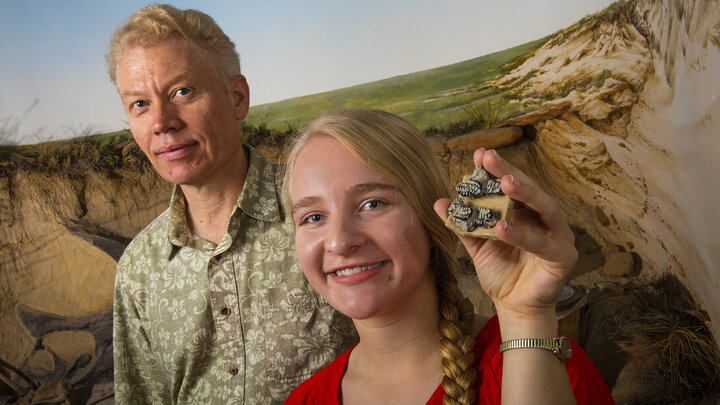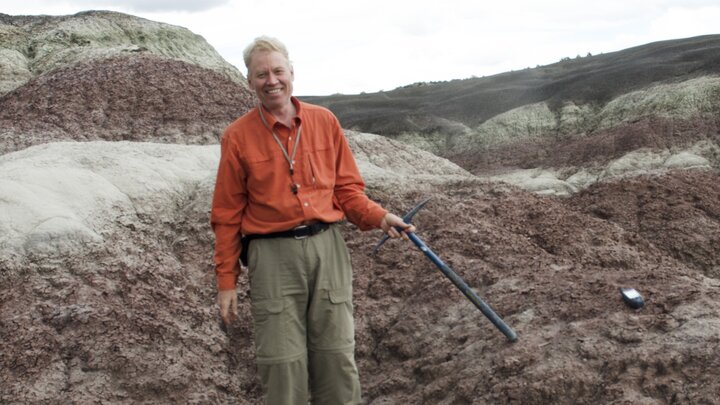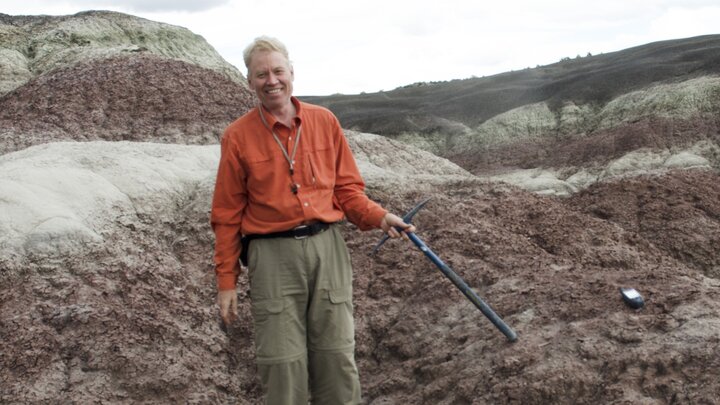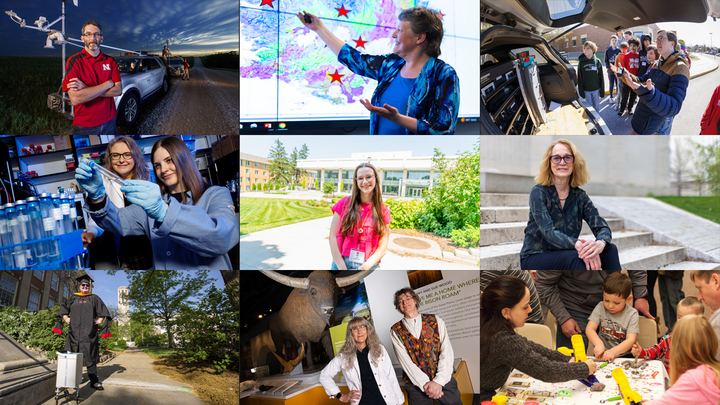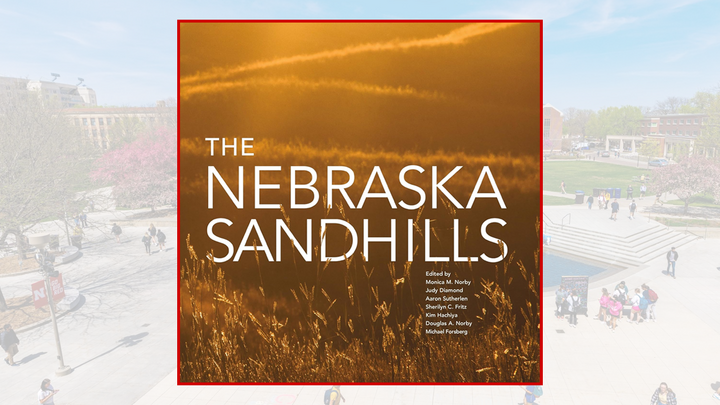"For geology, it's very important that you have field experience. You can't just read about rocks – you actually have to go look at them and touch them."
Q&A With Carissa Raymond
How did you get involved in the fieldwork in the San Juan Basin in New Mexico with associate professor of earth and atmospheric sciences Ross Secord?
I'm a geology major. You're required to take his class—a freshman level class—called "Historical Geography." Toward the end of the semester, he said that he needed some field hands and asked if there were any volunteers. I raised my hand and volunteered. I wasn't entirely certain what I was getting into, but it turned out all right.
What were your first thoughts about New Mexico? What kind of work did he say you'd have to do?
He said fossil collecting, which I wasn't familiar with at the time. You have those images in your head of digging up big dinosaur bones, but we didn't do that. We did a lot of surface collecting, where you just pick up teeth and jaws off of the surface of the weathering soil and rock.
Describe a typical day while you were there – what was the work like?
We were camping out in the middle of nowhere in some Bureau of Land Management (BLM) land. (BLM land is mandated by law to be used for conservation, recreation and protection of nature and artifacts among other uses.) We'd get up and have some breakfast, hike a few miles to whatever site we were working on and then just spend the entire day wandering around staring at the ground. Then, we'd come back for a quick supper. On this particular trip, we stayed in one place for maybe three days and then another place for another few days.
Were you in places that scientists knew there would be fossils?
It wasn't a wild goose chase because Dr. Secord's colleague down in New Mexico has been working in those areas for a couple decades now. He's pretty familiar with it. Actually, the place where I found the discovery we hadn't really intended to stop at because it's been collected for over 100 years and it's pretty laid out. We had a grad student along from the University of Edinburgh in Scotland, and she works in the older stuff, which is what we stopped to look at. It was just happenstance that they found a limb bone of something, and they were digging it out. So, we came back the next day, and those of us that weren't needed for that started looking around. Then, I just about stumbled upon this thing.
Okay, give us the before, during and after of finding the fossilized teeth – we want all of the details. What were you doing / looking for, and how did it catch your eye? What was going through your mind?
When Ross hired me, he showed me a few teeth in a jar so I would have an idea of what I was looking for, but that wasn't very helpful. It took me a few days to really figure out what teeth look like in the wild. I had finally gotten the search image down, and I was just wandering around. Like I said, it was a well-collected area, so there wasn't much at all. Then, I spotted this row of shiny black things that could only have been teeth. I was like, "Yay, I haven't found anything all day!" It was actually an entire jaw and part of the cranium.
And what did you say to alert someone that you thought you’d found something special?
Nobody was within earshot or visible range – it was a pretty big area. I bent down and picked up the first piece and then I noticed there were more pieces and got quite excited. I just sat there for maybe half an hour picking up all of the pieces. Then, I marked the spots and went looking for Dr. Secord and showed it to him. He got quite excited and called Tom over – they were hemming and hawing about it being something new. There's this other animal that looks similar but lived much later and they were thinking, "maybe it's that?" and "how did it get down here?" It was exciting either way.
What was the species that you found?
I'm not the expert on this, but it's called Kimbetopsalis-simmonsae. It's named after the Kimbeto Wash, where it was found, and Nancy Simmons, who is a researcher on these sorts of animals. (A wash is a dry bed of water – it's like a river, but only has water for short amounts of time every year.) The species lived in the Puercan, which is a land mammal age in the earliest paleogene – rock age. It was one of the first plant-eating mammals to develop just shortly after the dinosaur extinction. It was just starting to fill the niche. This is before rodents really got as big as they are now.
Why do you think you were able to do it? To what do you attribute the opportunity and your success?
The opportunity was just kind of dumb luck. I was in the class, he [Secord] needed help and I happened to be available. The success ... it turns out I'm actually pretty good at spotting teeth, which I did not expect. I think it's due to a lot of detail work as a child – like jigsaw puzzles and that kind of thing.
What does it feel like to be an undergrad who discovers a new mammal species?
I was not expecting to do that. I would have thought if I was to do something like this, it would have been in a couple of decades.
What does this mean for your future work as a student?
I've gone out with Dr. Secord several times since the initial trip, so that paid off.
And in the future as a professional?
I don't think it'll be too much, because I'm not intending to go the paleontology route. I'll stay in geology. There's always the chance that when I apply for grad school, they'll Google my name and then say, "Wow ... this person!"
What is your research in UCARE focused on?
My UCARE project is completely unrelated to this. It's studying the sand dunes near Kearney, Nebraska. I'm studying their age and grain size, which will tell us how long they were active.
How did you come across the opportunity to do UCARE research?
It was through my geography major. My adviser is a geography professor, and I talked to someone in the School of Natural Resources about my interests, and she said, "Well, there's this one guy." Everyone that I talked to about my interests pointed me toward this one guy.
What would you say to a student interested in UCARE research?
I'd say do it. I didn't think as a freshman that I would do research, but then this happened and UCARE happened. Doing this encouraged me to try and do more with my professors.
What’s next? Any other adventures in the works?
I spent a month out in Wyoming last summer and a few weeks in Wyoming the summer before. This summer, I have to take my capstone, which is also in Wyoming. I have to live out there for six weeks. My capstone is mostly mapping. You have to go out with a compass and notebook, wander around and look at rocks. For geology, it's very important that you have field experience. You can't just read about rocks – you actually have to go look at them and touch them.
What advice would you give to students looking for opportunities like those you've had?
Talk to your professors. It's not as scary as it might seem.
As a geology and geography major, what aspects of those disciplines interests you most?
For geology, I'm interested in focusing on quaternary geography, which is landscape evolution – how something will change over time. In geography, I'm using remote sensing and geographic information systems (GIS), which meshes nicely with the geology.
What pushed you to study geology and geography?
My dad is a geologist, but that never pushed me to do it. In high school, I needed one more science class. Botany was not offered that semester, and I didn't want to do physics or chemistry. I signed up for physical geography. It was really fun. The next semester I was applying for college and I was staring at the calendar. It was a lovely picture of a mountain, and I realized that I knew everything that had happened to form the mountain. I didn't know anything about rocks or geology, but I wanted to do it.
Besides discovering new mammals, what else keeps you busy outside of class?
I'm part of the American Association of Petroleum Geologists, which has a chapter here. We just started a new organization in my department this year, Students of Earth and Atmospheric Sciences, and I'm an officer. I'm involved in the Geology Student Association as well. I'm an officer of Love Memorial Cooperative – a residence hall that's self-governed on East Campus.
